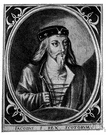James I
Also found in: Thesaurus, Medical, Encyclopedia, Wikipedia.
James I
1566-1625. King of England (1603-1625) and of Scotland as James VI (1567-1625). The son of Mary Queen of Scots, he succeeded the heirless Elizabeth I as the first Stuart king of England. His belief in the divine right of kings and his attempts to abolish Parliament and suppress Presbyterianism in Scotland created resentment that led to the English Civil War. He sponsored the King James Bible.
American Heritage® Dictionary of the English Language, Fifth Edition. Copyright © 2016 by Houghton Mifflin Harcourt Publishing Company. Published by Houghton Mifflin Harcourt Publishing Company. All rights reserved.
James I
n
1. (Biography) called the Conqueror. 1208–76, king of Aragon (1216–76). He captured the Balearic Islands and Valencia from the Muslims, thus beginning Aragonese expansion in the Mediterranean
2. (Biography) 1394–1437, king of Scotland (1406–37), second son of Robert III
3. (Biography) 1566–1625, king of England and Ireland (1603–25) and, as James VI, king of Scotland (1567–1625), in succession to Elizabeth I of England and his mother, Mary Queen of Scots, respectively. He alienated Parliament by his assertion of the divine right of kings, his favourites, esp the Duke of Buckingham, and his subservience to Spain
Collins English Dictionary – Complete and Unabridged, 12th Edition 2014 © HarperCollins Publishers 1991, 1994, 1998, 2000, 2003, 2006, 2007, 2009, 2011, 2014
ThesaurusAntonymsRelated WordsSynonymsLegend:
Switch to new thesaurus
| Noun | 1. |  James I - the first Stuart to be king of England and Ireland from 1603 to 1625 and king of Scotland from 1567 to 1625; he was the son of Mary Queen of Scots and he succeeded Elizabeth I; he alienated the British Parliament by claiming the divine right of kings (1566-1625) James I - the first Stuart to be king of England and Ireland from 1603 to 1625 and king of Scotland from 1567 to 1625; he was the son of Mary Queen of Scots and he succeeded Elizabeth I; he alienated the British Parliament by claiming the divine right of kings (1566-1625)Stuart - the royal family that ruled Scotland from 1371-1714 and ruled England from 1603 to 1649 and again from 1660 to 1714 |
Based on WordNet 3.0, Farlex clipart collection. © 2003-2012 Princeton University, Farlex Inc.